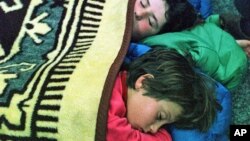A new study finds that preschool children who take a nap during the day have significantly better memory skills than children who do not rest. These findings suggest naps are an important teaching tool.
In much of the world, little children in preschool routinely take a nap as part of their day. But beyond the view that napping seems to be good for youngsters, there has been no scientific evidence of a benefit.
Now, investigators at the University of Massachusetts Amherst have found that napping improves memory for young children.
The sleep researchers assessed 40 youngsters between the ages of three and five from six preschools. They taught the kids a memory game that involved learning the locations of different pictures on a grid.
That afternoon, half the youngsters took a 77-minute nap while the other half were kept awake. After naptime, the children were asked to recall the locations of the objects.
Sleep researcher Rebeccca Spencer, a psychology professor, led the study.
“If you keep the kid awake during naptime, they forget 15 percent of that information that they learned in the morning, whereas if they take a nap during naptime, they remember 100 percent of what they learning in the morning," she said.
To make sure the children who didn’t nap were not simply inattentive or unmotivated, the researchers tested the children the next day and got the same results.
Spencer says her study's findings suggest that naptime during the preschool day should be encouraged.
“It’s important to recognize that these naps are actually serving academic goals of preschool," she said. "So, right now, we’re really focused on how kids need to learn more during that preschool day. And this is really saying that naps are assisting that goal."
Spencer says naps play a critical role in consolidating memory and enhancing learning in young children.
An article on the importance of napping in preschool children is published in the journal Proceedings of the National Academy of Sciences.
In much of the world, little children in preschool routinely take a nap as part of their day. But beyond the view that napping seems to be good for youngsters, there has been no scientific evidence of a benefit.
Now, investigators at the University of Massachusetts Amherst have found that napping improves memory for young children.
The sleep researchers assessed 40 youngsters between the ages of three and five from six preschools. They taught the kids a memory game that involved learning the locations of different pictures on a grid.
That afternoon, half the youngsters took a 77-minute nap while the other half were kept awake. After naptime, the children were asked to recall the locations of the objects.
Sleep researcher Rebeccca Spencer, a psychology professor, led the study.
“If you keep the kid awake during naptime, they forget 15 percent of that information that they learned in the morning, whereas if they take a nap during naptime, they remember 100 percent of what they learning in the morning," she said.
To make sure the children who didn’t nap were not simply inattentive or unmotivated, the researchers tested the children the next day and got the same results.
Spencer says her study's findings suggest that naptime during the preschool day should be encouraged.
“It’s important to recognize that these naps are actually serving academic goals of preschool," she said. "So, right now, we’re really focused on how kids need to learn more during that preschool day. And this is really saying that naps are assisting that goal."
Spencer says naps play a critical role in consolidating memory and enhancing learning in young children.
An article on the importance of napping in preschool children is published in the journal Proceedings of the National Academy of Sciences.




